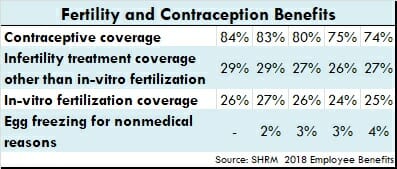As the youngest millennials reach their mid-twenties and the oldest enter their late thirties, gone are the days of unlimited snacks, ping-pong tables and office happy hours holding the top spots on their list of benefits that keep them engaged and loyal to their employers. Millennials, one of the most scrutinized generations in the workforce, are growing up, taking on more senior leadership roles within their companies, and voicing their desire for benefits that support their future, and the families they have or hope to have someday.
According to the Society for Human Resource Management’s (SHRM’s) 2018 Employee Benefits survey, 34% of firms increased their benefits offerings during the 12-month period prior to the survey.
At the time this information was released, Trent Burner, vice president of research at SHRM noted, “With the unemployment rate a historical low and 14 states setting record lows for unemployment in the last 12 months, organizations seem to be leveraging their benefits to recruit and retain talent…Between 2017 and 2018, the prevalence of over 60 surveyed benefits increased, compared with just 20 between 2016 and 2017,” signaling that “organizations are taking a closer look at their benefits programs to ensure they stay competitive.”
As HR and talent leaders use the next few months ahead of Q4 to examine their voluntary benefit programs, they must determine if its offerings are ageing gracefully with its workforce. Additionally, as family-friendly benefits, such as paid parental leave become increasingly important and improved, it is also imperative to think about how to support employees beyond an office baby shower and long before their new arrival joins the world.
Fertility benefits are one area where companies can make an outsized contribution to those workers struggling to start a family. While the percentage of workers taking advantage of the benefit is typically not high, for those who do, the emotional, let alone financial value of the benefit is immeasurable.
According to research conducted by FertilityIQ.com, when fertility services are covered by an employer benefits program:
- 73% of employees feel more grateful
- 61% feel more loyal
- 53% stay longer with their current employee
Fertility benefits are not something only major global corporations, like Facebook or Starbucks have the resources or budget to effectively implement. As SHRM’s benefits survey shows, a quarter or more of all employers cover infertility treatments and in-vitro fertilization. That includes smaller companies, which, with help, can implement fertility treatments and services into its benefit offerings, often at any point during the year.
For employees, this specific voluntary benefits offering typically includes access to medical professionals for support and advice throughout their family planning journey, connections to local fertility clinics and of course, important financial support.
For employers, the ROI is not only higher retention, but also improved productivity from cutting down on an employee’s time spent researching doctors, clinics, and treatment options, plus scheduling appointments, and reduced stress.
If it’s not clear by now, a large part of your workforce will likely grow their family in some way in the next 5-7 years, and as an employer, they will look to you to support them on this journey. If your company is not currently considering offering fertility or additional family-friendly benefits, take a second look at your benefits plan before next year. A well thought out program and partnering with the right fertility benefits platform is key to increasing loyalty, reducing churn, and maintaining an overall positive sentiment of the employer-employee relationship.
